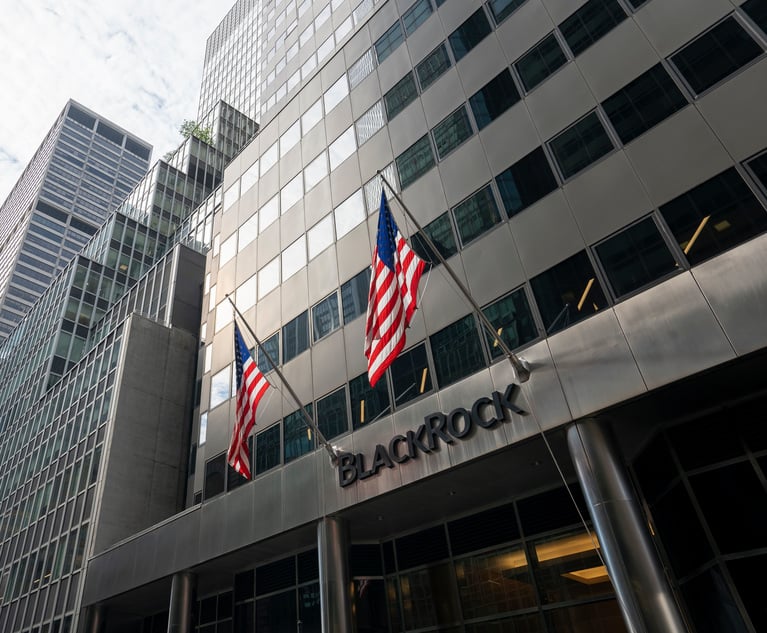 Fire boat response crews battle the blazing remnants of the off shore oil rig Deepwater Horizon on April 21, 2010. Photo: US Coast Guard via Wikimedia Commons
Fire boat response crews battle the blazing remnants of the off shore oil rig Deepwater Horizon on April 21, 2010. Photo: US Coast Guard via Wikimedia CommonsFla. Lawyer Says Lead Plaintiffs Attorney Drafted BP Oil Spill Settlement to Get $3B in Fees
Florida attorney Brian Donovan sued Steve Herman, of Herman, Herman & Katz, alleging he concocted an “eight-step plan" to boost legal fees and reduce BP's liability over Deepwater Horizon oil spill claims.
February 25, 2019 at 06:26 PM
7 minute read
A Florida attorney has alleged that a lead plaintiffs lawyer in the Deepwater Horizon oil spill litigation colluded with BP in drafting a class action settlement that gave more than $3 billion in legal fees.
Attorney Brian Donovan, of The Donovan Law Group in Tampa, filed the suit Feb. 12 in Florida's 13th Judicial District in Hillsborough County against Steve Herman, co-lead counsel for the multidistrict litigation against BP over the 2010 spill. Donovan claims that Herman, of New Orleans-based Herman Herman & Katz, was negligent and breached his duties to class members through an “eight-step plan to maximize his compensation” while reducing BP's liability over oil spill claims.
Herman, in an email to Law.com, stood by his handling of the Deepwater Horizon case, noting that he had addressed many of Donovan's concerns about the settlement in emails and in court during the original litigation.
But Donovan called the multidistrict litigation “an example of Louisiana judicial homecookin' at its very worst” in which both sides put the interests of the blowout's victims on the back burner.
“Justice for the BP oil well blowout victims was never considered by defendant Herman,” wrote Donovan in a 130-page complaint.
Donovan claimed in the lawsuit that the 19 lawyers on the plaintiffs' steering committee, including Herman, stood to earn more than $3 billion in fees, including both the common benefit fund and separate contingency fees they had with their clients.
“It is beyond cavil that a reasonable, objective observer would not conclude that this amount is out of proportion to the value of the professional services rendered,” he wrote in the complaint.
Donovan declined to comment about the suit.
 Steve Herman, of Herman Herman & Katz.
Steve Herman, of Herman Herman & Katz.
Herman questioned the validity of Donovan's numbers, and said he was apprised of his clients' full range of options.
In one 2012 email that was referenced in Donovan's complaint, Herman advised him on available procedures for his clients who opted out of the settlement.
Herman took note of that conversation in an emailed statement to Law.com.
“Seems like that was pretty good advice,” Herman wrote. “No idea the extent to which he or his clients may or may not have followed it.”
As to the allegations about fees, Herman wrote, “The common benefit fees are a matter of record. Neither Donovan, nor any of his clients (assuming he has any), nor anyone else objected to them. Nor did Donovan, nor any of his clients (assuming he has any), nor anyone who settled in the GCCF or the class settlement program ever pay one cent to the PSC or any other common benefit attorneys any common benefit fees.”
The suit is the latest skirmish over fees between leadership attorneys in multidistrict litigation and lawyers representing individual clients. In November, Philadelphia's Kline & Specter alleged that lawyers leading lawsuits over pelvic mesh devices had settled cases on the cheap, despite much larger jury verdicts. A federal judge in West Virginia rejected those allegations and approved $500 million in common benefit fees Jan. 30.
BP initially set up a claims process for individuals and businesses along the Gulf of Mexico who had lost money due to the 2010 spill and were entitled to compensation under the Oil Pollution Act of 1990. Attorney Kenneth Feinberg initially doled out claims, under the Gulf Coast Claims Facility, but plaintiffs lawyers criticized the process for lengthy delays and inconsistencies. In 2012, BP agreed to settle the class action, estimated to cost $7.8 billion, while a new administrator continued to process claims.
Over the years, BP revised its settlement cost estimate several times and even attacked portions of the deal for contributing to what it called a flood of fraudulent claims. Last month, BP, which also paid $20 billion to the U.S. Justice Department in 2015, raised its total projected oil spill costs to $65 billion, in large part due to outstanding claims in the class action settlement.
Donovan's suit alleged that Herman's “eight steps” involved limiting BP's liability in the class action settlement by restricting claims based on geography and other factors and, before that, encouraging claimants to drop their lawsuits in favor of quick cash under Feinberg's Gulf Cost Claims Facility.
Donovan called the leadership lawyers “cooperative dealmakers,” not adversaries to BP, who shut out 220,000 claimants in favor of their own clients.
“This deal was consummated behind closed doors,” he wrote. “In sum, plaintiff, plaintiff's clients, and all others similarly situated are being indefinitely held hostage by defendant Herman. Escape is impossible.”
Herman, in his email, defended his advocacy efforts, noting that he challenged the fairness of Feinberg's claims process in 2011. Feinberg, of The Law Offices of Kenneth R. Feinberg in Washington, D.C., defended his Gulf Coast Claims Facility as a “great success.”
“The idea that I coerced anybody is preposterous,” he said, noting that in 16 months, he distributed $6.5 billion to about 220,000 individuals and businesses in the Gulf of Mexico. “Now, years later, a very creative, determined, unenlightened plaintiffs lawyer decides to throw allegations around that are simply rejected by the facts.”
Donovan's suit estimated that lead lawyers would get $3.035 billion in fees. In the complaint, he based that figure on an estimated $2.4 billion in contingency fees, $600 million in common benefit fees, and co-counsel and holdback fees assessed on claims prior to the settlement.
He said more than $321 million went to members of the common benefit cost and fee committee and $277 million to other members of the plaintiffs' steering committee.
“I don't have any idea what any firm earned in individual client contingency fees,” Herman wrote in his email.
In 2012, U.S. District Judge Carl Barbier of the Eastern District of Louisiana capped contingency fees at 25 percent. Four years later, the judge appointed special master John Perry of Perry, Balhoff, Mengis & Burns of Baton Rouge, Louisiana, to review the allocation of $600 million in common benefit fees, paid for by BP.
In 2017, the common benefit cost and fee committee submitted a proposed allocation plan for 122 law firms. Herman and Jim Roy, a partner at Domengeaux Wright Roy & Edwards in Lafayette, Louisiana, who both were co-lead counsel in the multidistrict litigation and co-chairmen of that fee committee, recommended that each of their firms receive more than $87 million.
In 2017, Perry recommended approving the fee request, which grew to $700 million when including settlements with Halliburton and Transocean. Barbier adopted the special master's recommendation.
Soon afterward, Donovan filed a motion on behalf of three clients. The motion sought a public record of all compensation paid to the plaintiffs' steering committee, legal experts, special masters and the settlement claims administrator.
Barbier denied the motion on March 6 of last year.
This content has been archived. It is available through our partners, LexisNexis® and Bloomberg Law.
To view this content, please continue to their sites.
Not a Lexis Subscriber?
Subscribe Now
Not a Bloomberg Law Subscriber?
Subscribe Now
NOT FOR REPRINT
© 2025 ALM Global, LLC, All Rights Reserved. Request academic re-use from www.copyright.com. All other uses, submit a request to [email protected]. For more information visit Asset & Logo Licensing.
You Might Like
View All
Who Got the Work: Gibson Dunn and Wilmer to Defend BlackRock in ESG Antitrust Lawsuit
2 minute read
Improper Removal to Fed. Court Leads to $100K Bill for Blue Cross Blue Shield

US Courts Announce Closures in Observance of Jimmy Carter National Mourning Day
2 minute read
Am Law 200 Firm Steps In to Defend Boston Transportation Company in Trademark Dispute
Trending Stories
- 1Restoring Trust in the Courts Starts in New York
- 2'Pull Back the Curtain': Ex-NFL Players Seek Discovery in Lawsuit Over League's Disability Plan
- 3Tensions Run High at Final Hearing Before Manhattan Congestion Pricing Takes Effect
- 4Improper Removal to Fed. Court Leads to $100K Bill for Blue Cross Blue Shield
- 5Michael Halpern, Beloved Key West Attorney, Dies at 72
Who Got The Work
Michael G. Bongiorno, Andrew Scott Dulberg and Elizabeth E. Driscoll from Wilmer Cutler Pickering Hale and Dorr have stepped in to represent Symbotic Inc., an A.I.-enabled technology platform that focuses on increasing supply chain efficiency, and other defendants in a pending shareholder derivative lawsuit. The case, filed Oct. 2 in Massachusetts District Court by the Brown Law Firm on behalf of Stephen Austen, accuses certain officers and directors of misleading investors in regard to Symbotic's potential for margin growth by failing to disclose that the company was not equipped to timely deploy its systems or manage expenses through project delays. The case, assigned to U.S. District Judge Nathaniel M. Gorton, is 1:24-cv-12522, Austen v. Cohen et al.
Who Got The Work
Edmund Polubinski and Marie Killmond of Davis Polk & Wardwell have entered appearances for data platform software development company MongoDB and other defendants in a pending shareholder derivative lawsuit. The action, filed Oct. 7 in New York Southern District Court by the Brown Law Firm, accuses the company's directors and/or officers of falsely expressing confidence in the company’s restructuring of its sales incentive plan and downplaying the severity of decreases in its upfront commitments. The case is 1:24-cv-07594, Roy v. Ittycheria et al.
Who Got The Work
Amy O. Bruchs and Kurt F. Ellison of Michael Best & Friedrich have entered appearances for Epic Systems Corp. in a pending employment discrimination lawsuit. The suit was filed Sept. 7 in Wisconsin Western District Court by Levine Eisberner LLC and Siri & Glimstad on behalf of a project manager who claims that he was wrongfully terminated after applying for a religious exemption to the defendant's COVID-19 vaccine mandate. The case, assigned to U.S. Magistrate Judge Anita Marie Boor, is 3:24-cv-00630, Secker, Nathan v. Epic Systems Corporation.
Who Got The Work
David X. Sullivan, Thomas J. Finn and Gregory A. Hall from McCarter & English have entered appearances for Sunrun Installation Services in a pending civil rights lawsuit. The complaint was filed Sept. 4 in Connecticut District Court by attorney Robert M. Berke on behalf of former employee George Edward Steins, who was arrested and charged with employing an unregistered home improvement salesperson. The complaint alleges that had Sunrun informed the Connecticut Department of Consumer Protection that the plaintiff's employment had ended in 2017 and that he no longer held Sunrun's home improvement contractor license, he would not have been hit with charges, which were dismissed in May 2024. The case, assigned to U.S. District Judge Jeffrey A. Meyer, is 3:24-cv-01423, Steins v. Sunrun, Inc. et al.
Who Got The Work
Greenberg Traurig shareholder Joshua L. Raskin has entered an appearance for boohoo.com UK Ltd. in a pending patent infringement lawsuit. The suit, filed Sept. 3 in Texas Eastern District Court by Rozier Hardt McDonough on behalf of Alto Dynamics, asserts five patents related to an online shopping platform. The case, assigned to U.S. District Judge Rodney Gilstrap, is 2:24-cv-00719, Alto Dynamics, LLC v. boohoo.com UK Limited.
Featured Firms
Law Offices of Gary Martin Hays & Associates, P.C.
(470) 294-1674
Law Offices of Mark E. Salomone
(857) 444-6468
Smith & Hassler
(713) 739-1250








